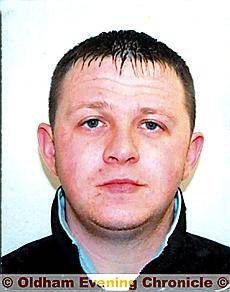Why did Gary ‘jump’ from Range Rover?
Date published: 17 July 2008

Gary Bradshaw
MYSTERY surrounds the death of a father-of-two found dying in the road after leaving an associate’s car.
Gary Bradshaw (27), from Beechwood Road, Fitton Hill, died from head injuries caused by falling from a car driven by Amjad Khan in September, 2006.
The original inquest was opened and adjourned last November after key witnesses failed to turn up. But after resuming the hearing yesterday, coroner Simon Nelson returned a preliminary open verdict.
The inquest heard how Mr Bradshaw owed £700 to Mr Khan (35), of Chief Street, Oldham.
The pair met in Fir Tree Avenue, Fitton Hill, on September 3, and Mr Bradshaw got into Mr Khan’s silver-coloured Range Rover.
Mr Khan told how during a short drive, he became angry about the money he was owed and began shouting at Mr Bradshaw.
But he was left puzzled when Mr Bradshaw’s appearance suddenly changed.
He began to shake and tried to open the door shouting: “Get me out.”
Mr Khan said he turned away for a split-second and when he looked back, Mr Bradshaw had left the car without having opened the door.
In a police interview, Mr Khan said he thought Mr Bradshaw had put his foot on the dash board and thrown himself out of a lowered window.
He told the inquest that through a wing mirror, he saw Mr Bradshaw tumble to the ground and then sit up, looking dazed.
Mr Bradshaw’s mother, Denise Bradshaw, from Stanley Street, Higher Openshaw, said that Gary had asked to borrow £600 to pay back Mr Khan who, he feared, would shoot him. But Mr Khan said he had never threatened Mr Bradshaw and had not threaten him in the car.
The inquest heard how Michaela Fleet (17), from Bardsley, had been walking along Keswick Avenue, Fitton Hill, that evening when she saw a Range Rover approach.
She said: “I saw it driving down and I saw something in the air. It was the back of Gary Bradshaw’s body.
Mr Bradshaw was taken to the Royal Oldham Hospital and transferred to Hope Hospital, Salford, but died nine days later.
Tests showed Mr Bradshaw had no alcohol in his blood but there were possible traces of cocaine which suggested he may have taken the drug in the early hours of the day he died but was not suffering its effects at the time of his accident.
Det Sgt James Sweeney said material and evidential deficiencies meant the Crown Prosecution Service had not pursued the matter, and the investigation was closed unless fresh evidence came to light.
Mr Nelson, who ruled out verdicts of deliberate self-harm or suicide, unlawful killing, accident or misadventure, gave a preliminary open verdict.
He now has 28 days in which to deliver a formal verdict.
Most Viewed News Stories
- 1Pair sentenced for firearms offences in Oldham
- 2Council chopped down trees 10 months ago, but the cuttings still remain
- 3Unsafe fake Labubu dolls seized by Oldham Trading Standards
- 4Royton friends set to take on 90-mile charity walk in memory of popular local dad
- 5Police discover cannabis farm in St Mary's




